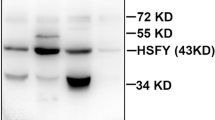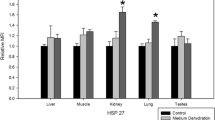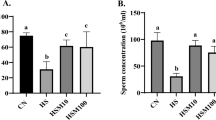Abstract
Few studies have focused on the expression of heat shock proteins (HSPs) after chronic heat stress. The objective of this study was to investigate the effect of chronic high temperature–humidity index treatment on the expressions of HSP60, HSP70, HSP90, HSPA2 and HSC70, in the Rex rabbit testis and the expressions of these proteins after recovery from the chronic heat shock. Thirty mature male rabbits of the same age were randomly divided into three groups: control, heat stress, and recovery. The western blot results showed that the expressional levels of HSP60, HSP90, and HSC70 increased significantly and HSPA2 was elevated slightly after a 9-week heat treatment. HSP70 was absent in the control testis and had a high level of expression after heat stress. All of these proteins partially reverted back to normal levels after a 9-week recovery. The immunohistochemical results indicated that the expression patterns of HSP60, HSP90, HSPA2, and HSC70 did not change.




Similar content being viewed by others
Abbreviations
- HSP:
-
Heat shock protein
- THI:
-
Temperature–humidity index
- HSC:
-
Heat shock cognate protein
- CON:
-
Control
- HS:
-
Heat stress
- RE:
-
Heat stress recovery
- IHC:
-
Immunohistochemistry
References
Adly MA, Assaf HA, Hussein MR (2008) Heat shock protein 27 expression in the human testis showing normal and abnormal spermatogenesis. Cell Biol Int 32:1247–1255
Becker J, Craig EA (1994) Heat-shock proteins as molecular chaperones. Eur J Biochem 219:11–23
Bernardini C, Fantinati P, Zannoni A, Forni M, Tamanini C, Bacci ML (2004) Expression of HSP70/HSC70 in swine blastocysts: effects of oxidative and thermal stress. Mol Reprod Dev 69:303–307
Biggiogera M, Tanguay RM, Marin R, Wu Y, Martin TE, Fakan S (1996) Localization of heat shock proteins in mouse male germ cells: an immunoelectron microscopical study. Exp Cell Res 229:77–85
Brown CR, Martin RL, Hansen WJ, Beckmann RP, Welch WJ (1993) The constitutive and stress inducible forms of hsp70 exhibit functional similarities and interact with one another in an ATP-dependent fashion. J Cell Biol 120:1101–1112
Bukau B, Horwich AL (1998) The Hsp70 and Hsp60 chaperone machines. Cell 92:351–366
Cao W, Huang P, Zhang L, Wu HZ, Zhang J, Shi FX (2009) Acute heat stress increases HSP70 expression in the testis, epididymis and vas deferens of adult male mice. Nat J Androl 15:200–206
Chen MS, Featherstone T, Laszlo A (1996) Amplification and altered expression of the hsc70/U14 snoRNA gene in a heat resistant Chinese hamster cell line. Cell Stress Chaperones 1:47–61
Cvoro A, Matić G (2000) Glucocorticoid receptor interaction with Hsp90 remains unaltered after whole body hyperthermia. Stress 3:257–260
Eddy EM (1999) Role of heat shock protein HSP70–2 in spermatogenesis. Rev Reprod 4:23–30
Feng HL, Sandlow JI, Sparks AE (2001) Decreased expression of the heat shock protein hsp70-2 is associated with the pathogenesis of male infertility. Fertil Steril 76:1136–1139
Gao J, Gao ES, Yang Q, Walker M, Wu JQ, Zhou WJ, Wen SW (2007) Semen quality in a residential, geographic and age representative sample of healthy Chinese men. Hum Reprod 22:477–484
Georgopoulos C, Welch WJ (1993) Role of the major heat shock proteins as molecular chaperones. Annu Rev Cell Dev Biol 9:601–634
Grad I, Cederroth CR, Walicki J, Grey C, Barluenga S, Winssinger N, de Massy B, Nef S, Picard D (2010) The molecular chaperone hsp90α is required for meiotic progression of spermatocytes beyond pachytene in the mouse. PLoS One 5:e15770
Huang HC, Lee WC, Lin JH, Huang HW, Jian SC, Mao SJT, Yang PC, Huang TY, Liu YC (1999) Molecular cloning and characterization of porcine cDNA encoding a 90-kDa heat shock protein and its expression following hyperthermia. Gene 226:307–315
Lin KM, Lin B, Lian IY, Mestril R, Scheffler I, Dillmann WH (2001) Combined and individual mitochondrial HSP60 and HSP10 expression in cardiac myocytes protects mitochondrial function and prevents apoptotic cell deaths induced by simulated ischemia-reoxygenation. Circulation 103:1787–1792
Liu Z, Wang G, Pan Y, Zhu C (2004) Expression of androgen receptor and heat shock protein 90alpha in the testicular biopsy specimens of infertile patients with spermatogenic arrest. Zhonghua Nan Ke Xue 10:662–666
Marai IFM, Ayyat MS, Abd El-Monem UM (2001) Growth performance and reproductive traits at first parity of New Zealand white female rabbits as affected by heat stress and its alleviation under Egyptian conditions. Trop Animal Health Prod 33:451–462
Marai IFM, Habeeb AAM, Gad AE (2002) Rabbits' productive, reproductive and physiological performance traits as affected by heat stress: a review. Livest Prod Sci 78:71–90
Meinhardt A, Parvinen M, Bacher M, Aumuller G, Hakovirta H, Yagi A, Seitz J (1995) Expression of mitochondrial heat shock protein 60 in distinct cell types and defined stages of rat seminiferous epithelium. Biol Reprod 52:798–807
Mosser DD, Caron AW, Bourget L, Meriin AB, Sherman MY, Morimoto RI, Massi B (2000) The chaperone function of hsp70 is required for protection against stress-induced apoptosis. Mol Cell Biochem 20:7146–7159
Neuer A, Spandorfer SD, Giraldo P, Dieterle S, Rosenwaks Z, Witkin SS (2000) The role of heat shock proteins in reproduction. Hum Reprod Update 6:149–159
Oishi Y, Taniguchi K, Matsumoto H, Ishihara A, Ohira Y, Roy RR (2002) Muscle type-specific response of HSP60, HSP72, and HSC73 during recovery after elevation of muscle temperature. J Appl Physiol 92:1097–1103
Ścieglińska D, Wojciech P, Mazurek A, Małusecka E, Zebracka J, Filipczak P, Krawczyk Z (2008) The HspA2 protein localizes in nucleoli and centrosomes of heat shocked cancer cells. J Cell Biochem 104:2193–2206
Son WY, Hwang SH, Han CT, Lee JH, Kim S, Kim YC (1999) Specific expression of heat shock protein HspA2 in human male germ cells. Mol Hum Reprod 5:1122–1126
Sreedhar AS, Csermely P (2004) Heat shock proteins in the regulation of apoptosis: new strategies in tumor therapy—a comprehensive review. Pharmacol Ther 101:227–257
Tao SX, Guo J, Zhang XS, Li YC, Hu ZY, Han CS, Liu YX (2006) Germ cell apoptosis induced by experimental cryptorchidism is mediated by multiple molecular pathways in Cynomolgus Macaque. Front Biosci 11:1077–1089
Viitanen PV, Lorimer GH, Seetharam R, Gupta RS, Oppenheim J, Thomas JO, Cowan NJ (1992) Mammalian mitochondrial chaperonin 60 functions as a single toroidal ring. J Biol Chem 267:695–698
Vydra N, Winiarski B, Rak-Raszewska A, Piglowski W, Mazurek A, Scieglinska D, Widlak W (2009) The expression pattern of the 70-kDa heat shock protein Hspa2 in mouse tissues. Histochem Cell Biol 132:319–330
Wegele H, Haslbeck M, Reinstein J, Buchner J (2003) Sti1 is a novel activator of the Ssa proteins. J Biol Chem 278:25970–25976
Welch WJ (1993) Heat shock proteins functioning as molecular chaperones: their roles in normal and stressed cells. Philos Trans R Soc Lond B Biol Sci 339:327–333
Werner A, Meinhardt A, Seitz J, Bergmann M (1997) Distribution of heat-shock protein 60 immunoreactivity in testes of infertile men. Cell Tissue Res 288:539–544
Widłak W (2006) The heat shock response and HSP70 gene expression in male germ cells. Postepy Biochem 52:289–295
Wu C (1995) Heat shock transcription factors: structure and regulation. Annu Rev Cell Dev Biol 11:441–469
Wu YJ, Pei YL, Qin YH (2011) Developmental expression of heat shock proteins 60, 70, 90, and A2 in rabbit testis. Cell Tissue Res 344:355–363
Zaprjanova S, Rashev P, Zasheva D, Martinova Y, Mollova M (2011) Electrophoretic analysis of Hsp72 and Hsp73 expression in male reproductive tissues. CR Acad Bulg Sci 64:529–534
Zhang XS, Lue YH, Guo SH, Yuan JX, Hu ZY, Han CS, Sinha Hikim AP, Swerdloff RS, Wang C, Liu YX (2005) Expression of Hsp105 and Hsp60 during germ cell apoptosis in the heat-treated testes of adult cynomolgus monkeys (Macaca fascicularis). Front Biosci 10:3110–3121
Zhou XC, Han XB, Hu ZY, Zhou RJ, Liu YX (2001) Expression of Hsp70-2 in unilateral cryptorchid testis of rhesus monkey during germ cell apoptosis. Endocrine 16:89–95
Acknowledgments
This work was supported by the Earmarked Fund for Modern Agro-Industry Technology Research System (CARS-44) and the Natural Science Foundation of China (31001009).
Author information
Authors and Affiliations
Corresponding author
Additional information
Yangli Pei and Yingjie Wu contributed equally to this work.
Rights and permissions
About this article
Cite this article
Pei, Y., Wu, Y. & Qin, Y. Effects of chronic heat stress on the expressions of heat shock proteins 60, 70, 90, A2, and HSC70 in the rabbit testis. Cell Stress and Chaperones 17, 81–87 (2012). https://doi.org/10.1007/s12192-011-0287-1
Received:
Revised:
Accepted:
Published:
Issue Date:
DOI: https://doi.org/10.1007/s12192-011-0287-1




